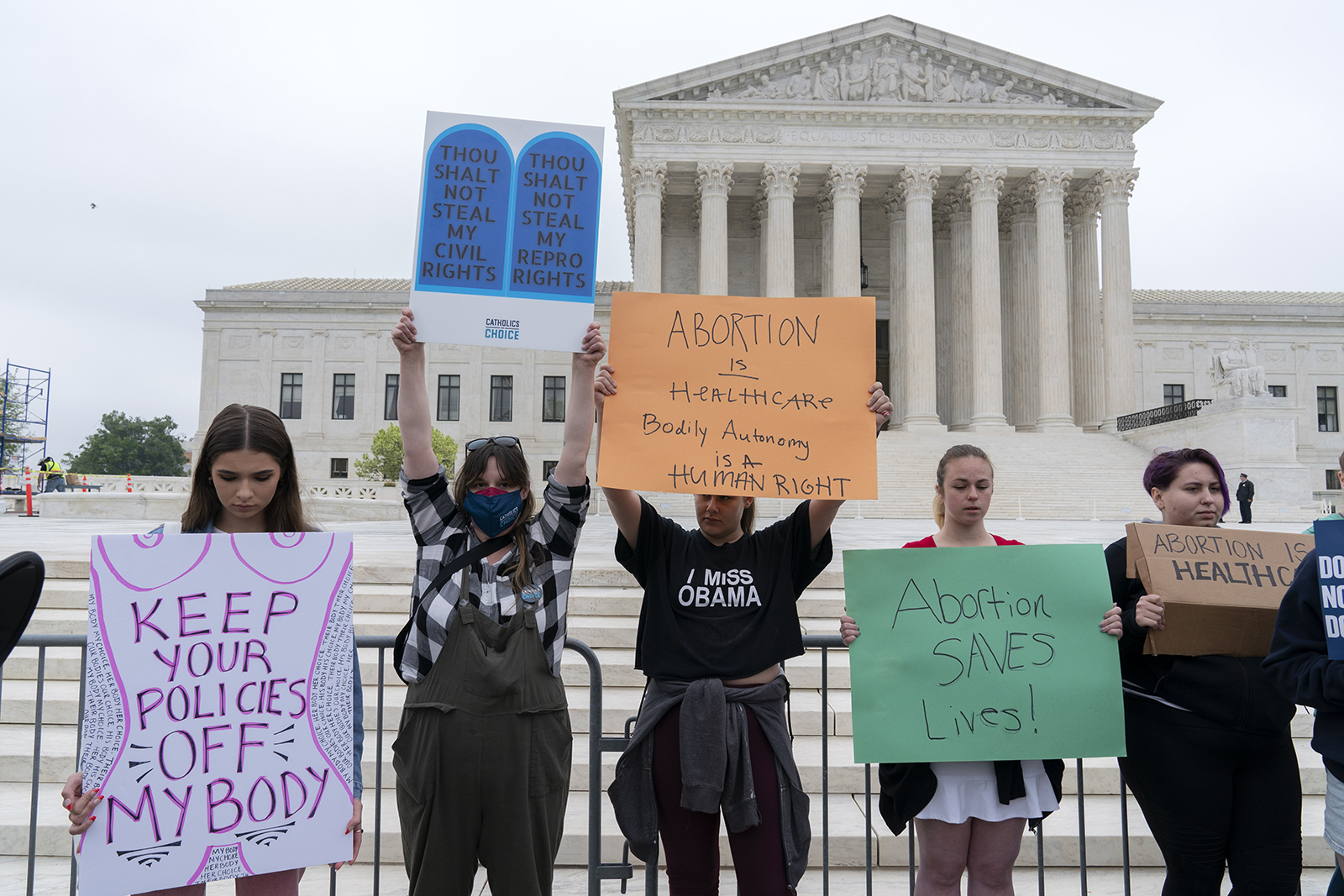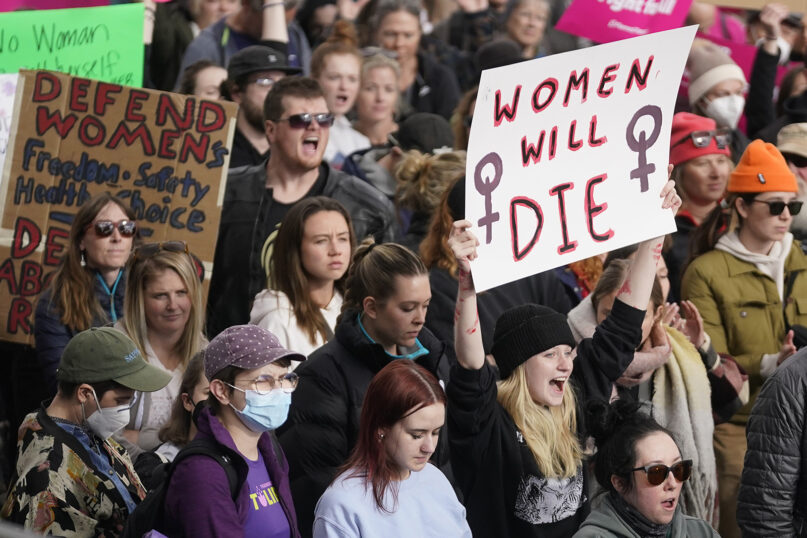(RNS) — Conservative Christians have been successful in recent years in winning exemptions from health care laws, nondiscrimination laws (especially those governing women’s and LGBTQ equality) and even workplace harassment laws.
Now, however, with the prospect of Roe v. Wade being overturned and abortion being criminalized in dozens of states, religious exemptions will need to start flowing to other groups. For starters, exemptions must be granted to any Jewish person seeking to practice their religion and obtain an abortion.
While Judaism gives rise to multiple views regarding abortion (“Ask two Jews, get three opinions” goes the joke), the mainstream of Jewish law overwhelmingly holds that life begins at birth, not conception. Jewish law not only permits abortion; when the life of the mother is at stake, it requires it.
There are two biblical bases for this view.
First, the Torah is clear that a fetus is not regarded as a human life. Though capital punishment was, according to the Talmud, never actually meted out by a Jewish rabbinic court, the Torah specifies, many times, that murder is to be punished “life for life.” Yet according to Exodus 21:22, when an assault on a pregnant woman results in a miscarriage, only monetary damages are due.
RELATED: For red-state clergy who back abortion rights, losing Roe is a call to action
Whatever the problematic elements of this law, it clearly indicates that a fetus is not equivalent to a human life; otherwise, as many states are now proposing, killing it would constitute murder. Various Talmudic passages elaborate on this view, regarding a fetus before six weeks as “mere fluid” and afterward as “its mother’s thigh” — an appendage of the mother, not a life in itself.
The notion that Judaism is “pro-life” in the narrow, contemporary meaning of the term is thus profoundly mistaken.
Second, when someone or something is threatening to kill a human being, that person or thing is known as a rodef, or pursuer, and it is incumbent upon others to do anything — including killing — to stop it. While the Bible only speaks in terms of a thief breaking into a home, Talmudic law expands the concept to include any imminent threat to a human life.
Thus, in gruesome detail, the Talmud requires that if a woman is having difficulty giving birth, one must “cut up the child in her womb and bring it forth limb by limb” rather than allow the mother to possibly die. The great medieval sage Maimonides said that one must do this “without compassion” for the fetus, because it is a rodef, adding that drugs or surgery is acceptable.
Later rabbinic sources extended this position to include preventing emotional pain as well. Rabbi Jacob Emden, a renowned (and extremely conservative) 18th century Jewish legal authority, held that abortion is permitted when giving birth would cause “woe” or “great pain,” such as the shame then associated with extramarital sex. In the late 20th century, Orthodox rabbis held that this principle also extends to situations where the fetus has been diagnosed with a serious genetic disease or birth defect.
Today, while positions vary by denomination, all demand some exemptions from a blanket abortion ban. Some Orthodox authorities oppose “abortion on demand” but require an abortion when the mother’s life is in danger. Some Reform and Conservative organizations — which, importantly, include the voices and experiences of women — permit abortion in all cases, and so Conservative and Reform Jews require an exemption in all cases.
And of course, the question of whether an act is religiously permissible is distinct from whether the government should allow or prohibit it.

Demonstrators protest outside the U.S. Supreme Court, May 3, 2022, in Washington. A draft opinion suggests the U.S. Supreme Court could be poised to overturn the landmark 1973 Roe v. Wade case that legalized abortion nationwide, according to a Politico report released May 2. (AP Photo/Jose Luis Magana)
The point, however, is clear: if Jewish women are to exercise their religion freely, they must be allowed to terminate a pregnancy, with the specific conditions dependent upon her particular beliefs. Compliance with the laws of Mississippi, Texas, Oklahoma and other states that have promised to ban abortion is in direct conflict with the practice of Judaism.
Fortunately or not — and for LGBTQ people like myself, definitely not — courts have recognized over the last two decades that religious exemptions are mandated by the federal Religious Freedom Restoration Act and the many state versions of it. Generally, under RFRA, the government must show that any law that substantially burdens religious practice is “narrowly tailored to serve a compelling government interest.”
In the 2014 Hobby Lobby case, a closely held corporation owned by a religious family successfully argued that RFRA required that the company be exempted from the Affordable Care Act’s mandate that employers’ insurance plans cover contraception. Any Jewish woman in a state that prohibits abortion must be granted the same kind of exemption. If such an exemption is not written into the ban itself, then she may sue, as Hobby Lobby did, to have a court declare it.
Indeed, it’s even possible the Supreme Court may find that the Constitution itself, rather than RFRA, requires that this strict standard be met for laws that burden religious exercise. Many commentators believed it would do so last year in a case involving a Catholic foster care agency that discriminated against gay couples.
That didn’t happen, much to the relief of liberals, but it may happen soon. In a series of “shadow docket” cases on COVID-19 regulations, a majority of the court said even protecting human lives from a deadly pandemic does not justify “discriminating” against churches and synagogues.
RELATED: Even abortion foes will help friends who choose to end a pregnancy
Finally, it does not matter whether the woman bringing a RFRA claim is Orthodox, Reform or of any other denomination as long as she professes sincere beliefs that are clearly part of an existing religious tradition. Courts are not arbiters of religious doctrine; if a claimant establishes that the doctrine exists and professes belief in it, that is the end of the inquiry. In any case, every interpretation of Jewish law requires some exemption from an abortion ban; the only question is one of scope.
Abortion foes may not like this result, but it is the necessary result of the past decade of Supreme Court jurisprudence. Religious practitioners are exempted from liberal-backed laws that burden their religion, and now religious practitioners must be exempted from conservative-backed laws that burden theirs. That includes abortion bans, which conflict with millennia-old teachings of Judaism.
(Rabbi Jay Michaelson is an attorney who has covered the Supreme Court for New York magazine, the Daily Beast and other outlets. The views expressed in this commentary do not necessarily reflect those of Religion News Service.)





